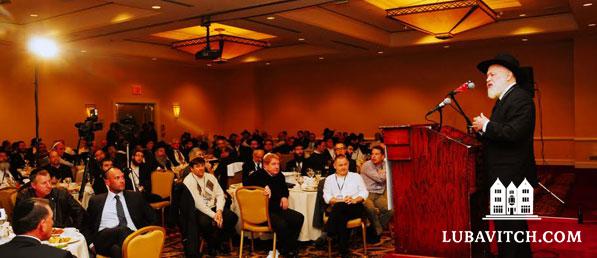(lubavitch.com) Before 2006, David Gavsie, a massage therapist from Montreal, Canada never dreamed he would spend a Friday night around a Shabbat table in a Chasidic home, let alone participate in a convention with some 3,000 Chasidic rabbis.
But after meeting Rabbi Fine, director of Chabad Queen Mary in Montreal, Gavsie began studying Chasidic texts. Chabad’s focus on body and soul inspired him to find symmetry in his own life, and the therapist decided to deepen his personal relationship with his rabbi and community.
Gavsie is but one of growing numbers of lay leaders who join their local Chabad representatives at each year’s International Conference of Chabad Emissaries. Lay leaders typically bond with the families of the shluchim and form deep and mutually meaningful friendships, becoming partners in Chabad’s outreach activities.
Sunday, lay leaders participated at a series of workshops and presentations exploring the role of both the individual and the community in the work of the Chabad-Lubavitch movement. The program was hosted in the New York Marriott Downtown Hotel.
Dr. Michael Glassner, head of the Pennsylvania based Mainline Fertility clinic, describes the evolution of his relationship with his shliach, Rabbi Shraga Sherman of Merion Station, PA. A self-described “High Holidays” New York Jew, Glassner began his spiritual search and quest for meaning after the tumultuous days following the September 11 attacks. Eventually his search brought him to the Shermans’ home.
An expert on infertility and IVF procedures, Glassner sought to help bridge the gap between in vitro treatment and the strict requirements of Jewish Law, enabling Orthodox Jews suffering from infertility to access modern treatment. This quest culminated in 2007, when his clinic became one of only thirteen organizations in both North and South America to join the auspices of the Puah Foundation, an Israeli organization that ensures that all procedures comply with Jewish halachic standards.
The tragic events of the Mumbai attacks last November would prove to be a catalyst in Glassner’s role as a lay leader. Looking to respond to the destruction of life last year when six Jews were murdered in the Mumbai Chabad House, Glassner chose to step up his efforts at bringing new life into the world.
Reaching out through Chabad’s extensive network to Shluchim and other members of the community suffering from infertility, Glassner successfully treated three couples. All three couples were blessed with twins, bringing a total of six new souls into the world through his efforts. The process of IVF, while highly successful, comes with a price tag of as much as $15,000 per cycle of treatment. Because these are prohibitive costs for most Shluchim, Glassner has vowed to personally finance all future cases within the family of Chabad representatives. In this way, says Glassner, he sees his actions as deepening the role of a lay leaders in society.
“If we take personal charge of an initiative, we will not just walk in the footsteps of, or stand beside our Shluchim, but rather we can help lead as well.”
The economic recession provides other opportunities for the lay leaders to take new leadership roles. Business acumen, for example, is a valuable asset in the market of investing in the soul. Mark Sessel of Orange, CT, president of a life insurance carrier based in the tri-state area, points out that, “Just as in any down market, a time of recession is an optimal time to gain market-share despite the inherent difficulties of spending when it is tight, now is Chabad’s opportunity to capitalize on gaining new ground by branching out and finding new people to become involved in philanthropic work.”
In an address to the general session of the event, Mr. Guma Aguiar, energy industrialist and owner of the Beitar Jerusalem football team, spoke about the life-altering effect Chabad’s work had on him. Raised without any Jewish observance, Aguiar did not know that he was Jewish until he was 26 years old.
A chance encounter with Rabbi Moshe Meir Lipszyc of Ft. Lauderdale, led Aguiar to deepen his spiritual connections. Aguiar has since become an active philanthropist supporting Jewish outreach in Israel and the Diaspora. Mr. Aguiar says he draw inspiration from the Shluchim he so admires.
“It is our duty to reach out on all levels,” he said. “From the community to the individual, we must bring the message and the legacy of the Lubavitcher Rebbe to fruition.”
In his concluding remarks to the session, Rabbi Yehuda Krinsky, Chairman of Merkos L’inyonei Chinuch, the educational division of Chabad-Lubavitch, noted the power of the partnerships forged between Chabad representatives and the lay leaders. Despite the hardships of the past year, both those physical and spiritual, the Chabad movement has continued to grow with the partnership of the community members who have taken to its cause.

Be the first to write a comment.